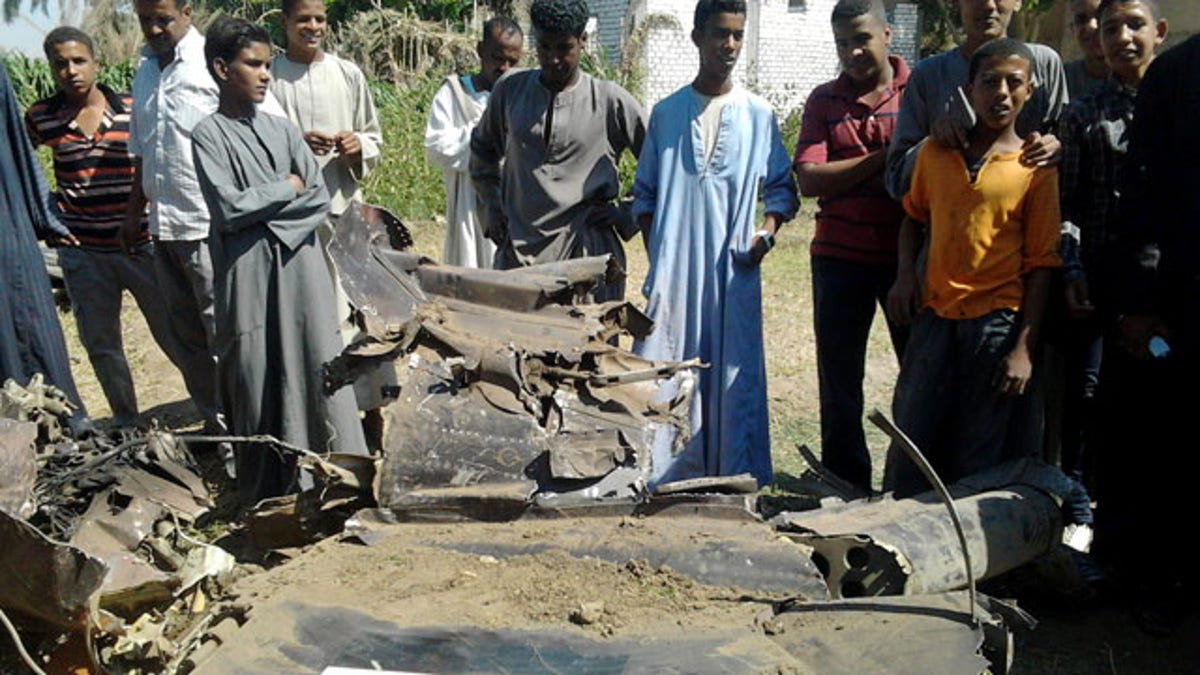
October 13, 2013: Egyptians gather around the remains of a Soviet-made MiG-21 fighter jet belonging to the Egyptian air force that crashed Sunday, while on a training mission near the southern ancient city of Luxor, which officials said killed a villager on the ground and injured several. (AP Photo)
CAIRO – The Egyptian government said a U.S. citizen it detained in the Sinai Peninsula last month for violating curfew was found dead Sunday in his jail cell, the second foreigner to die in detention in recent weeks.
The U.S. Embassy in Cairo confirmed that an American citizen held prisoner in the Suez Canal city of Ismailia died from an apparent suicide and that it was in contact with Egyptian authorities. It had no further comment.
In Washington, the State Department identified the American as James Lunn and said U.S. consular officials in Cairo were informed of his arrest on Aug. 28, a day after the Egyptians detained him. Consular officials had been in touch with Egyptian authorities and Lunn since, it said.
A statement by the Egyptian Interior Ministry, which is in charge of police, said Lunn was detained on Aug. 27 during "combing operations" that followed a car bombing outside a police station in the turbulent northern region of Sinai. It said a computer and maps of "important installations" were found in his possession. It did not identify the facilities.
Lunn, it continued, was remanded in police custody and was remanded again for 30 days by a court on Saturday. He was found hanged on Sunday at the door of the bathroom of his cell block in an Ismailia police station. Lunn had a visit from a U.S. consulate official last Tuesday, it added.
A coroner has been appointed to determine the cause of death, the statement said.
Security officials earlier said he was a retired U.S. Army officer, a claim denied by the State Department. Lunn arrived in Cairo from the Gulf kingdom of Bahrain on Aug. 25, Egyptian officials said. They had said he was detained by army troops in Sinai three days later while making his way to the border crossing with Gaza in the town of Rafah.
He was flown to Ismailia on a military aircraft and handed over to the police there, the officials said. Jailers found him dead after he used his belt and shoe laces to hang himself, the officials said. They spoke on condition of anonymity because they were not authorized to speak to journalists.
The Interior Ministry and the security officials earlier mistakenly identified the American as James Henry Allen and James Henry. Such confusion is common in Egypt in the case of foreign names that are transliterated from English, often with some liberty.
The American is the second foreigner to die in Egyptian custody since last month. Then, authorities said cell mates beat a French man to death after his arrest in Cairo's upscale district of Zamalek for violating curfew.
The latest death is likely to revive the furor about poor conditions and human rights violations in Egyptian jails. Two Canadian citizens jailed for weeks before their release last week complained of torture and inhuman conditions.
However, the State Department said Lunn had at no time complained to U.S. consular officials that he had been maltreated by the Egyptians. It confirmed the Egyptians' claim that Lunn was last visited by a U.S. consular officer on Oct. 8.
The American's arrest came at a time when the military and security forces are fighting Islamic militants in northern Sinai, where they have been attacked daily since the overthrow of Islamist President Mohammed Morsi in a July 3 military coup. Authorities have arrested more than 2,000 Morsi supporters since, including leaders of his Muslim Brotherhood, in the biggest campaign against Islamists since the early 1980s.
Authorities slapped a nighttime curfew on much of Egypt in August following a wave of violence stemming from the popularly backed military coup.
Meanwhile Sunday, a Soviet-made MiG-21 fighter jet belonging to the Egyptian air force crashed while on a training mission near the southern ancient city of Luxor, killing a villager on the ground and injuring three, officials said. The pilot bailed out and parachuted safely to the ground.
The plane crash set several houses on fire and damaging an elementary school. The fire was quickly put out, said security and medical officials, speaking on condition of anonymity because they were not authorized to speak to the media.
Col. Ahmed Mohammed Ali, a military spokesman, said on his official Facebook page that the plane crashed as a result of a mechanical failure. He gave no other details.
The Russian-made MiG warplanes and other Soviet-made aircraft were once the backbone of Egypt's air force. They began to be replaced by U.S.-made fighter jets, mainly the F-16, starting from the 1980s.
